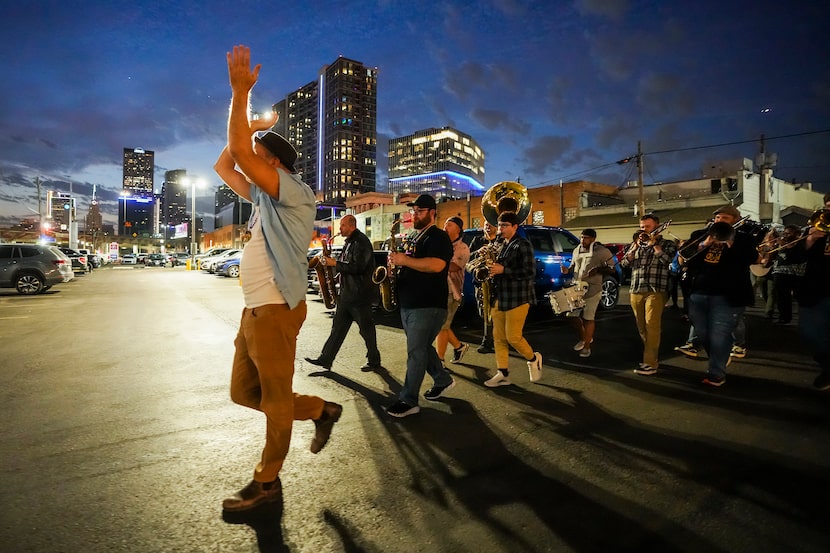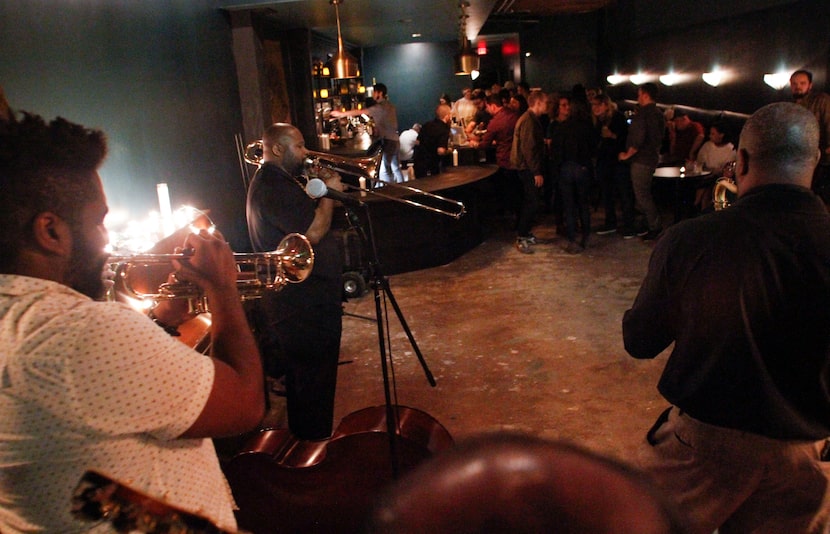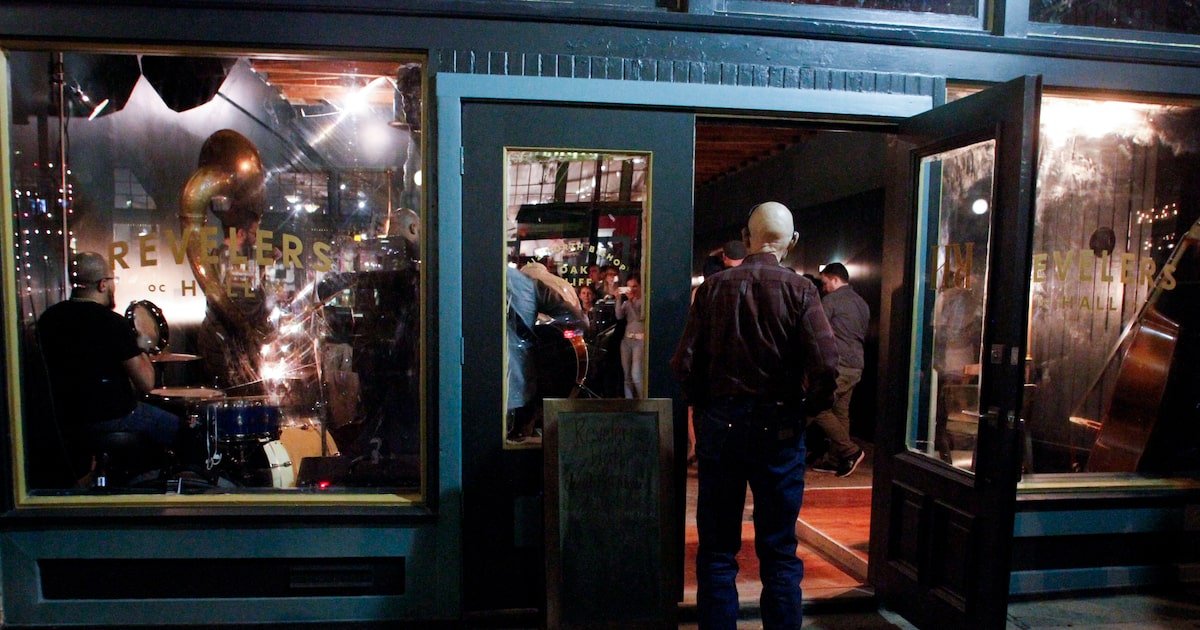
Jason Roberts has spent the last 20 years trying to make Dallas a much hipper town. And, at every turn, the city has pushed back. It’s like I once wrote: Roberts, the Oak Cliff urbanist-turned-Bishop Arts entrepreneur, figured out a long time ago that “sometimes you gotta break a few of Dallas City Hall’s more antiquated laws to make a better Dallas.”
That was 10 years ago. Now let me take you all the way back to Oct. 5.
On that night less than three weeks ago, one of the city’s code compliance officers walked into one of the four Bishop Arts businesses Roberts co-owns, the New Orleans-style bar and restaurant Revelers Hall, which holds 65 patrons, not including the brass bands that regularly fill its calendar. An officer handed a manager a notice of violation, which alleged the venue was operating as an “unpermitted use” and was creating “loud and disturbing noises and vibrations.”
Revelers Hall, which opened in 2019 and is hailed by Visit Dallas a live-music must-visit, was given zero days to correct the two violations. Another notice of violation was delivered 11 days later.
The noise thing is just silly when you consider that Revelers Hall is the kind of place where grinning passersby stop long enough to shoot photos and videos through the usually wide-open front doors. Chad West, the council member for North Oak Cliff, told me Wednesday that “it’s literally the only place my parents ask to visit when they come to town.”
Opinion
The “unpermitted use” thing is a little more complicated. Because there are rules on the books prohibiting restaurants from charging cover. They’ve just never been enforced. Until now.
Jason Roberts (left) and Amy Wallace Cowan own four businesses in Bishop Arts: Trades Delicatessen, Revelers Hall, Oddfellows and Jaquval, where this portrait was taken two years ago.
Shafkat Anowar / Staff Photographer
Since it opened, Revelers Hall has charged patrons a little extra for live music; it used to be $5, then it went all the way to $6. That’s how Roberts and co-owner Amy Wallace Cowan pay the musicians who made their New Orleans-scented jazz joint one of Visit Dallas’ go-tos.
Yet the city now says that’s not allowable under the section of city code that regulates inside commercial amusements, which could mean anything from an adult cabaret to a skating rink. The city maintains that as soon as a business adds an entertainment fee, that “reclassifies the business use from a restaurant to a Commercial Amusement (Inside) use.”
But that section of the city code was seldom, if ever, enforced until the city recently expanded its Nighttime Entertainment Strike Team, whose operations will cost $244,838 this fiscal year and $334,612 next fiscal year, according to the city’s newly adopted budget. That five-person team is supposed to collaborate with Dallas Fire-Rescue and Convention & Event Services to, among other things, “proactively address nuisance conditions.” By, apparently, targeting businesses that are anything but nuisances.
The only district specifically mentioned in the new budget is Deep Ellum. Which is where the Cajun-flavored Free Man, another Visit Dallas recommendation, also got dinged with the same alleged fee-charging violation though it, too, has been charging for live music since it opened in 2011.
The Free Man’s owner, John Jay Myers, posted to Facebook on Oct. 9 that the cover charge “guaranteed a reasonable, livable wage” for the musicians. But he wrote that the violation, paired with the interminable construction on Commerce Street, could well deal that club a “fatal blow.”

The Free Man’s owner John Jay Myers leads members of the Smoking’ Aces Brass Band, with other musicians joining in, during a second-line Mardi Gras march through Deep Ellum to celebrate Fat Tuesday in 2003.
Smiley N. Pool / Staff Photographer
Mayor Pro Tem Jesse Moreno, whose district includes Deep Ellum, texted me Wednesday saying he has asked “staff to review and offer suggestions for updating our code to ensure that the heart and soul of Deep Ellum is protected: our live music!” He said he held a meeting this week with the Deep Ellum Foundation and neighborhood business owners to make sure they understand what’s going on.
“Unfortunately,” he said, “there have been a lot of changes to the teams who work to manage these issues at the city. Moving forward, we need clear direction from city staff in what the function and role is from the night time economy office.”
The Free Man’s story got picked up by the TV news a few days ago, prompting Roberts and Cowan to take to social media to share stories of the strike team’s move into Bishop Arts. At which point I called Roberts to discuss his latest chapter in what appears to be his neverending tale of How to Fight City Hall.
The city told Roberts and Cowan they could add a “service fee” to the bill instead of charging a cover for live music. But customers saw that, figured it meant tip, and the bar staff was left empty-handed. And increasing prices, Roberts said, is just a nonstarter.
“If we have to adjust and pivot, we will figure that out,” he said over breakfast Wednesday at Trades Delicatessen, which he and Cowan run next door to their Jaquval brewpub and around the corner from their Oddfellows eatery. “But Amy’s point is, we’ve been a good partner, we’ve been working well. And we’ve figured out this interesting way to actually pay talent what they deserve for six and a half years. Maybe the city would look at us and be like, ‘OK, so why don’t we rewrite some of the rules based on this model?’
“Everyone says no, and that’s where everyone stops. We’re going to have to figure out how we’re going to work around it.” He laughed. “I’ve made a career of breaking rules.”
“You mean not taking no for an answer,” I tell him.
“Not taking no for an answer, yes,” he said, grinning under his beard. “And pushing back on the system. Pushing back on conventional wisdom.”

The band Congo Square played Revelers Hall in Bishop Arts when it opened in March 2019.
Brian Elledge / Staff Photographer
That’s what happened nearly 20 years ago, when Roberts fought to resuscitate the streetcar line Dallas long ago buried under concrete and cars. That’s what happened 15 years ago, when he calmed a chaotic North Oak Cliff intersection by temporarily installing pedestrian amenities and pop-up shops. That’s what happened 13 years ago, when he helped install bike lanes along Knox Street.
City staffers told him all of that couldn’t be done, shouldn’t be done. Roberts, a founding member of Go Oak Cliff, did it anyway. As a result, the TEDTalker turned the phrase Better Block into an international movement and got himself an invite to the Obama White House where he was hailed as a Champion of Change. And Bishop Arts was quickly overrun with tourists from North Dallas who never considered venturing to that side of the Trinity River.
“Jason is how I discovered North Oak Cliff, with the Mardi Gras Parade,” staged annually by Go Oak Cliff, West told me Wednesday. “He probably doesn’t know that.”
And this is the thanks he gets.
Thursday morning, I also heard from Simon McDonald, owner of Lower Greenville’s Libertine Bar, which opened in 2006, making it one of the area’s oldest operators. He said the strike team’s down there, too. The bar closes at midnight, but McDonald said he was fined for closing his kitchen at 10 p.m.
“We had to hire additional staff and do a late-night menu to placate them,” McDonald said. Something he’d never had to do in nearly 20 years of operation.
I sent a few unanswered emails to Rosa Fleming, director of Convention and Event Services, asking why this strike team is going after popular businesses without histories of causing problems. Because, from the outside, this looks like bad business.
In 2023, the Pennsylvania company Tourism Economics and Visit Dallas published the report Economic and Fiscal Contributions of the Nightlife Economy in Dallas, TX, which said Bishop Arts, Deep Ellum and Greenville Avenue alone account for more than $850 million in total economic impact. Said the report, “the Dallas nightlife economy is poised to evolve to continue its role as a key driver in the regional economy.”
Unless the strike team gets its way.
“I couldn’t be more frustrated,” West told me. “Our code is just antiquated, and staff hasn’t even looked at older code provisions for retail, restaurants and storefront uses. What’s frustrating to me is it’s taken this situation for us to open it up and look at it. That’s usually the case, I guess. But I have expressed my frustration to city staff: ‘You’re looking for problems instead of solutions.’”
And suddenly we have another contender for a new city of Dallas motto.

